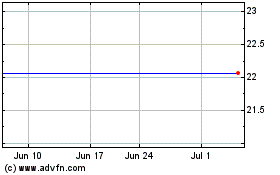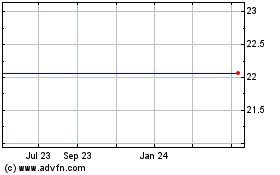By Esther Fung
The real-estate investment trust industry, which has gotten high
marks in recent years for adopting compensation programs that
investors like, has suffered a bit of slippage in 2016.
So far this year, four REITs including mall giant General Growth
Properties Inc. have had pay plans rejected by shareholders in
nonbinding votes. By comparison, only one REIT received such a
drubbing in 2015.
Proxy advisory firm Institutional Shareholder Services Inc.
pointed out that there is still more room for improvement,
especially among some externally-managed REITs. ISS recommended
that investors vote against the compensation programs of 25 REITs
this year, up from 14 last year.
"The REIT industry as a whole has taken somewhat of a black eye
because of a number of bad-acting, smaller companies that have not
provided transparency at all," said John Roe, head of advisory at
ISS Corporate Solutions.
Other REITs on the wrong side of the nonbinding "say-on-pay"
votes this year included residential mortgage firm Hatteras
Financial Corp.; commercial property owner Consolidated-Tomoka Land
Co.; and Senior Housing Properties Trust. Hatteras Financial and
Senior Housing Properties Trust are externally-managed REITs.
Mark Collinson, a Hatteras Financial spokesman, said that
investor unhappiness about pay is "not relevant" anymore because
the firm is currently in the middle of a merger that would result
in management changes. Senior Housing Properties Trust and
Consolidated-Tomoka Land didn't respond to emailed requests for
comment.
The REIT industry has been more aggressive than others in
addressing concerns over executive pay. The sector is among the
five industries with the best compensation programs, according to
ISS.
But average total pay for chief executives of the top 100 REITs
reached an all-time high last year at $5.2 million, up 9% from a
year earlier, according to a report in May by FPL Associates, a
Chicago-based real-estate compensation consultancy. The pace of
growth in executive compensation has also grown faster than their
firms' stock performance, marking the first time since 2011 where
compensation among these REITs rose at a higher rate than stock
returns for the year.
SL Green Realty Corp.'s CEO Marc Holliday made $23 million last
year, up 24% from 2014, making him the second-highest paid REIT
executive. Shares of New York City's largest office landlord fell
5.1% in 2015. ISS recommended that investors vote against SL
Green's compensation program, for the second straight year.
SL Green sent a letter to shareholders saying ISS's
recommendation on its say-on-pay proposal was unwarranted. It said
that Mr. Holliday's 2015 reported compensation should be $14.8
million rather than $23 million, after adjustments over valuation
on equity awards and other bonuses are made.
SL Green's compensation proposal garnered support from 54.8% of
its shareholders during a vote held early June. The company didn't
respond to a request for comment.
The negative investor vote on General Growth's plan was
surprising because the company got yes votes the past three
years.
ISS recommended a no vote this year for General Growth CEO
Sandeep Mathrani because his pay package was oversize compared with
peers. There were "several problematic features" in the employment
agreement with Mr. Mathrani, including an annual incentive of at
least $2 million in 2015 and 2016; a $25 million five-year equity
retention grant; and an excise tax provision that would increase
potential termination agreements, giving executives a possible
incentive to cut merger deals that may not be in the best interests
of shareholders, ISS said.
Mr. Mathrani's total compensation for 2015 was $39.2 million,
making him the highest paid REIT executive. General Growth pointed
out, in response to queries, that after spreading the retention
grant over five years, his compensation for 2015 totaled $17.7
million.
General Growth's proxy statement filed in April with the
Securities and Exchange Commission said Mr. Mathrani received an
incentive package in February 2015 in exchange for signing a
five-year employment agreement. His "leadership skills and
demonstrated ability to drive business results are critical to the
long-term success of the company," it said.
The proxy statement added that peer group data isn't a
determining factor in setting compensation for its executives due
to differences in role and experience and that compensation for
comparable peers may be the result of the firm's own under
performance or over performance for that year.
Analysts say other REITs have continued to make improvements in
compensation. As a whole, across 147 REITs that already had
shareholders cast their votes, there was a 95.8% acceptance rate,
compared with 96.2% across the Russell 3000, according to ISS
data.
"Consistent with previous years, companies have continued to
make positive enhancements to broader corporate governance and
compensation-related provisions," said Jeremy Banoff, a senior
managing director with FPL.
Real-estate CEOs generally got better pay increments last year
compared with their peers in other sectors. This was partly because
their stock returns generally outperformed the broader stock
indexes such as the S&P 500 and Russell 3000 in 2015.
Shareholder returns from REITs rose 3% in 2015, compared with the
0.7% decline and 0.5% rise recorded by S&P 500 and Russell
3000, respectively, over the same period.
Median pay for the CEOs of nearly 300 large publicly traded
companies slipped 3.8% to $10.8 million last year from $11.2
million in 2014, a Wall Street Journal analysis of compensation
data from MyLogIQ found.
Write to Esther Fung at esther.fung@wsj.com
(END) Dow Jones Newswires
June 21, 2016 12:21 ET (16:21 GMT)
Copyright (c) 2016 Dow Jones & Company, Inc.
GGP Inc. (NYSE:GGP)
Historical Stock Chart
From Aug 2024 to Sep 2024

GGP Inc. (NYSE:GGP)
Historical Stock Chart
From Sep 2023 to Sep 2024
